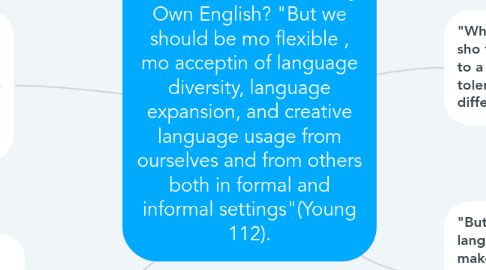Should Writer's Use They Own English? "But we should be mo flexible , mo acceptin of language diversity, language expansion, and creative language usage from ourselves and from others both in formal and informal settings"(Young 112).
by Ciani Wells

1. "And that's my exact argument, that we all should know everybody's dialect, at least as many as we can, and be open to the mix of them in oral and written communication" (Young 111).
1.1. People should be open to understanding their neighbors' dialect. This country is filled with people from multiple ethnicities and cultural backgrounds. In order to relate to and understand each other, we must all have some sort of understanding of each other's way of speaking.
1.2. When one way of speaking such as Standard American English is valued over another, this automatically places people who are less familiar with it at a disadvantage.
2. In my own experience teaching grad students, they also tend to try too hard to sound academic, often using unnecessary convoluted language, using a big word where a lil one would do, and stuff" (Young 113).
2.1. Just as in speeches, in writings, it is also important to be mindful of the motive and intentions of the author. A piece written by a student to fulfill an assignment may be less authentic than one written for leisure.
3. "Where do I begin, cuz this man sho tryin to take the nation back to a time when we were less tolerant of linguistic and racial differences" (Young 110).
3.1. It's regressive and detrimental to hold onto habits of discrimination.
3.2. Not being inclusive is an easy way to welcome discrimination and oppression.
4. "But it don't be nobody's language , dialect, or style to make them "vulnerable to prejudice." It's ATTITUDES. It be the way folks with some power perceive other people's language" (Young 110).
4.1. The way someone speaks does not automatically make them a target to discrimination. It's societies perception of that language that perpetuates prejudice.
4.2. Sometimes, it is best for people to listen to the message and not focus too much on the method. A person can be conveying a very important message and others may miss it due to being too judgmental of the method in which it is expressed (diction).
4.3. It is toxic to blame people for their own oppression.
4.4. Various forms of dialect are important for a person to appeal to their subgroup(s).



